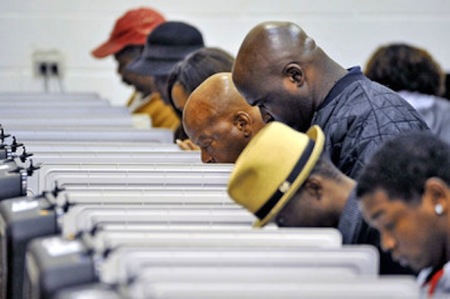A recent study into the thoughts, opinions and habits of Britain’s ethnic youth has found that while ethnic minorities have a deeper interest in politics than their white counterparts, they are less likely to vote.
The research, titled ‘Our Ethnic Youth: Redefining Generation Y’ questioned 1,700 18-29 year olds from 10 different ethnic backgrounds and “provides insights on areas of fundamental importance to the industry, including media consumption, networks and connectivity, aspirations, digital habits, content creation and curiosity, and the importance of heritage.”
They found that 44% of non-white youth believed that politics was extremely important in comparison to 39% of whites.
However when it came to their voting habits only 34% of ethnic youth said they were likely to vote in the next election, compared to 44% of white youth.
In addition to this, the study by media agency Manning Gottlieb also revealed that 64% of non-white youth believed that it was important for their backgrounds to be represented in politics, while only 11% of the white youth felt this to be true. This highlights the fact that ethnic minorities are grossly underrepresented in UK politics. Out of 650 UK MPs only around 30 come from BAME backgrounds.
“Politics are really important to ethnic young people,” Manning Gottlieb’s head of insight, Alison Tsang stated. “But when we looked at voting intention in the next general election, our white British youth are significantly more likely to vote, compared with our ethnic youth.
“It’s not because the ethnic youth are not engaged or don’t care about politics. If we look at all the research that we have, it’s probably a representation issue at the moment: there’s no kind of motivating representatives in the field of politics.”
The study also looked at the communication and shopping habits of ethnic minorities, putting to bed the ill-conceived notion that young ethnic minorities are near impossible to target. For example a significantly higher number of non-white youths consumed media (reading newspapers, listening to the radio), used social networking sites and were more up to date with the latest technology and gadgets in comparison to white youths in the same age bracket. In relation to this, the study found that status symbols such as the aforementioned gadgets, as well as cars were more important to ethnic youth, who felt that racial stereotyping means they have to take greater care to project a positive image.
“Despite real and perceived barriers in researching ethnic audiences, I believe we’ve conducted research, and created insights which fill a genuine knowledge gap on an important and increasingly influential audience.” Tsang added.
“Giving our under 30 Ethnic Youth population a vital mouthpiece has resulted in fresh, up to date insights which are hugely beneficial to our agency, clients and media partners. It’s all part of our commitment here at Manning Gottlieb OMD, at delivering sharper, relevant insights which push the boundaries of our work.”
BAME youth also communicate more with friends and family members and friends on a regular basis and are more likely to “share positive experiences with their network”.
Manning Gottlieb’s study aims to shed light on “this previously overlooked audience”.
Currently ethnic minority youths make up a quarter of generation Y and by 2016 half of the UK’s ethnic minorities will be under the age of 12.











